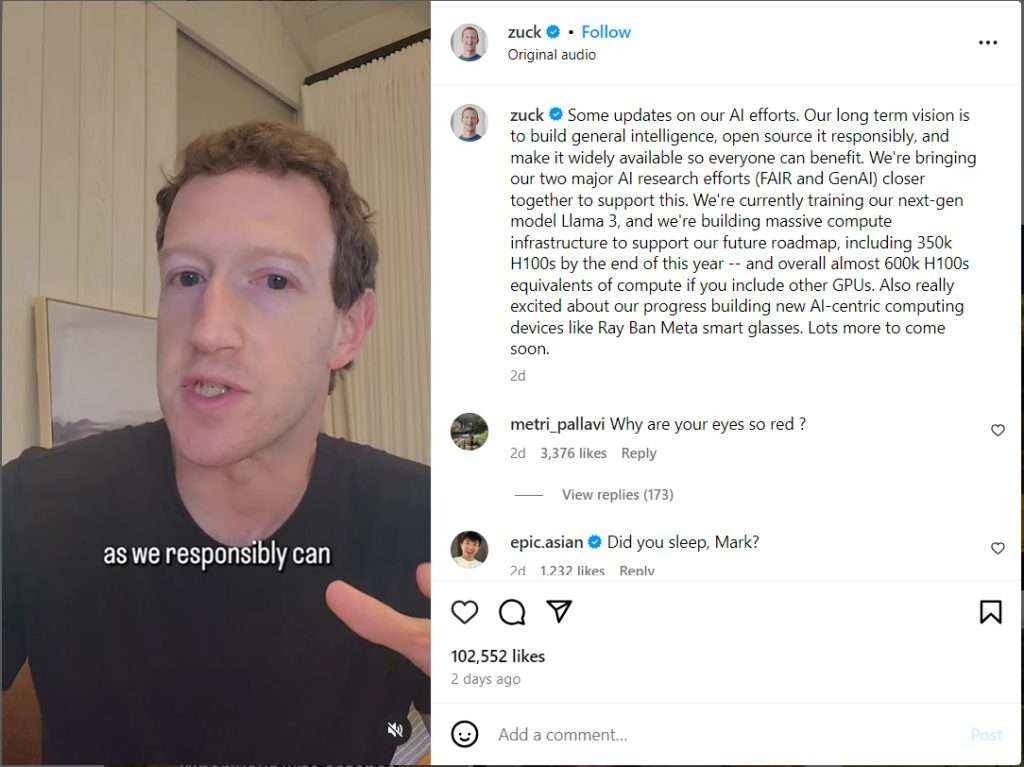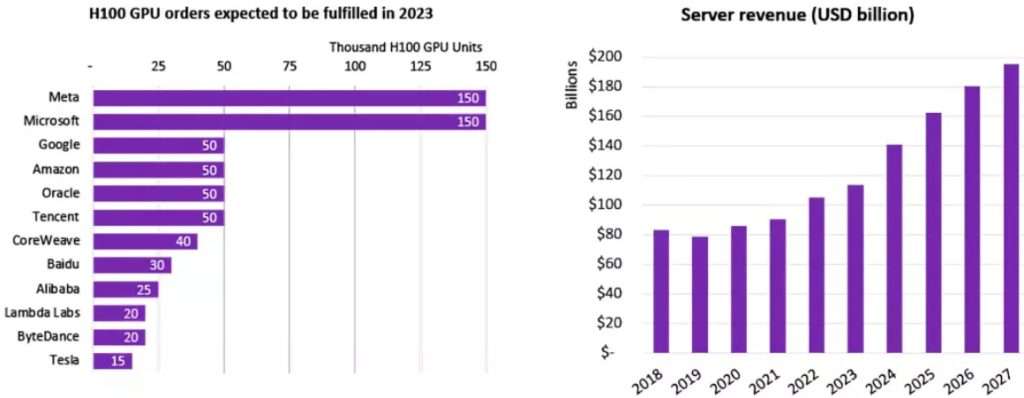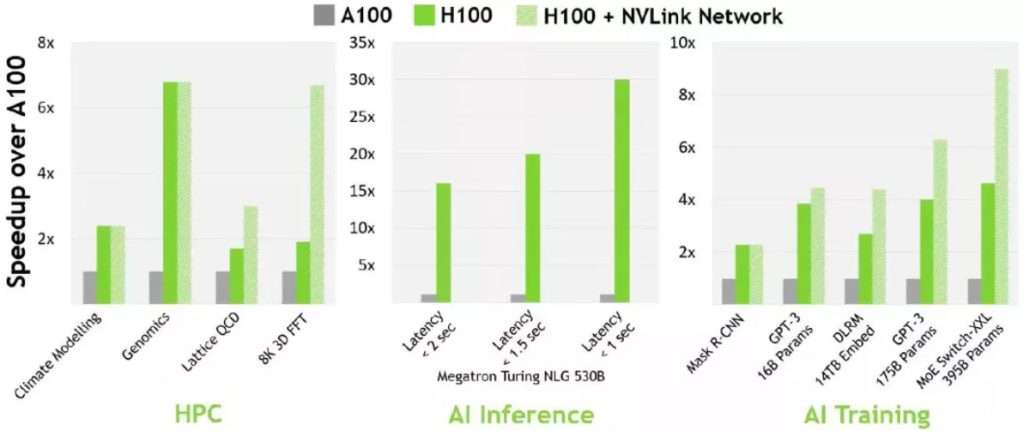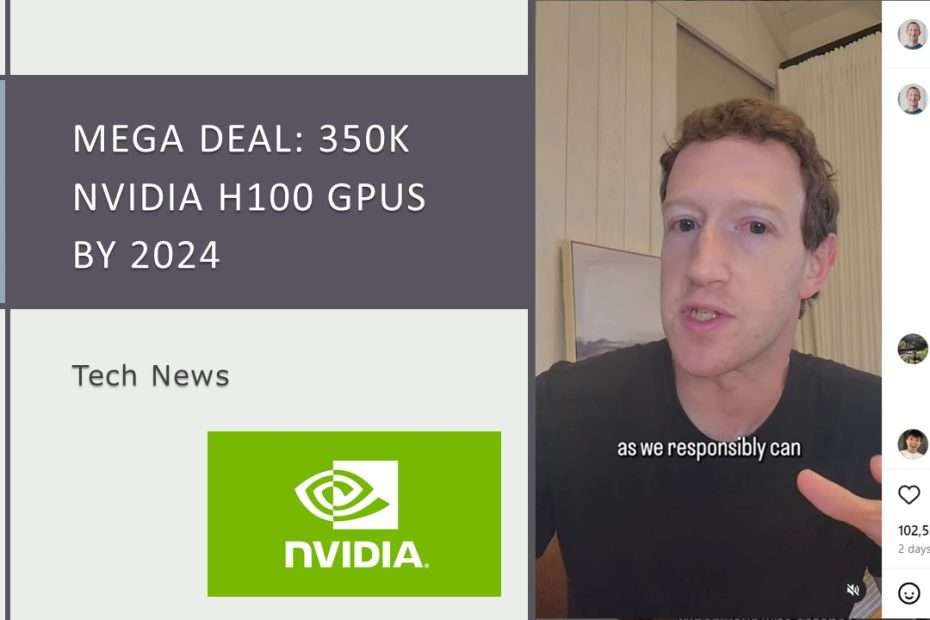Meta CEO Mark Zuckerberg has recently disclosed the company’s substantial investment plans in Nvidia hardware and various AI initiatives, scheduled to materialize by the conclusion of 2024. In a post on Instagram, Zuckerberg elucidated Meta’s strategic vision, emphasizing an increased commitment to advancing open-source artificial general intelligence (AGI). This ambitious initiative aims to create a versatile foundation that can seamlessly support a spectrum of applications, ranging from enhancing productivity and software development to facilitating the integration of wearable technologies and AI-powered virtual assistants.

Mark Zuckerberg, CEO of Meta, recently shed light on the company’s significant infrastructure investment, revealing plans to procure about 350,000 units of Nvidia’s H100. This substantial acquisition is further magnified when considering Meta’s additional GPU purchases, bringing the total equivalent of H100 units to an impressive 600,000. The scale of this investment signals Meta’s strategic move to bolster its computational capabilities, indicating a robust commitment to staying at the forefront of technological advancements.
To put things into perspective, the sheer magnitude of compute power represented by this acquisition is noteworthy. The acquisition of hundreds of thousands of H100 units underscores Meta’s dedication to scaling up its infrastructure, potentially paving the way for innovative developments in artificial intelligence, data processing, and other computationally intensive tasks. This strategic move positions Meta to handle increasingly complex workloads and supports the company’s ambitions for future technological breakthroughs.
Omdia, a market analysis company, reported that the demand for Nvidia’s H100 GPUs in the previous year was notably spearheaded by Meta and Microsoft. Surprisingly, both Meta and Microsoft individually surpassed the combined purchases of tech giants such as Google, Amazon, and Oracle. This data underscores the significant role Meta has played in driving the demand for high-performance computing hardware, positioning itself as a major player in the technological landscape. With this trend continuing, the additional order of 350,000 units solidifies Meta’s standing as one of Nvidia’s foremost and substantial customers.
The dominance of Meta and Microsoft in H100 orders indicates a strategic focus on advanced computing capabilities, aligning with their respective visions for future technological innovations. As Meta continues to invest heavily in Nvidia hardware, it not only secures its position as a major customer but also signifies the company’s commitment to harnessing cutting-edge technology to power its ambitious endeavors, from artificial intelligence to data-intensive tasks. This ongoing collaboration between Meta and Nvidia highlights the pivotal role played by high-performance GPUs in shaping the landscape of modern computing.
Mark Zuckerberg emphasizes that Meta’s substantial investment in AI infrastructure is a necessity for the development of a comprehensive artificial general intelligence (AGI). The envisioned AGI is expected to empower researchers, creators, and consumers globally by providing capabilities such as reasoning, planning, and coding. This strategic move aligns with Meta’s commitment to advancing technological capabilities and fostering innovation across various domains. Moreover, the company aims to responsibly develop and release the new AI model as an open-source product, emphasizing accessibility for users and organizations of all sizes. This approach underscores Meta’s dedication to collaborative progress and signifies a broader vision for democratizing advanced AI technologies.
However, the surge in demand for Nvidia’s H100 GPUs has led to extended lead times, posing challenges for companies awaiting fulfillment. Omdia’s report indicates that lead times for Nvidia H100 orders have ranged from 36 to 52 months, reflecting the soaring demand for cutting-edge AI hardware. This extended waiting period could potentially impact the competitiveness of companies relying on these GPUs for their AI initiatives. The industry’s appetite for advanced AI solutions is evident in the challenges presented by supply chain constraints, highlighting the urgency for effective strategies to navigate the evolving landscape of AI hardware demands.

The primary motivation behind Meta’s significant investment, as well as that of other companies, in AI resources lies in the pursuit of increased computing power and processing speed. Nvidia’s H100, especially when equipped with InfiniBand Interconnect, stands out as a pivotal advancement in this regard. The H100 is reported to deliver processing speeds that are up to 30 times faster than its predecessor, the Nvidia A100, particularly in mainstream AI and high-performance computing (HPC) models. This substantial leap in speed and efficiency is a driving force for organizations like Meta, positioning the H100 as a key component in their pursuit of cutting-edge AI capabilities.
The competitive edge provided by the accelerated processing capabilities of the H100 is underscored by its potential to revolutionize AI and HPC applications. Meta’s strategic move to acquire a significant number of these GPUs aligns with the industry’s demand for advanced computing solutions. The focus on enhancing processing speed is not merely a matter of technological prowess but a strategic imperative in staying ahead in the rapidly evolving landscape of artificial intelligence.
The recently acquired Nvidia H100 units by Meta not only signify a substantial increase in computing power but also boast remarkable improvements in processing rates. Specifically, these units exhibit three times the processing rates for both IEEE FP64 (double-precision) and FP32 (single-precision) when compared to their predecessor, the A100. This significant boost in processing efficiency can be attributed to several factors, including enhanced clock-for-clock performance per streaming multiprocessor (SM), the inclusion of additional SM counts, and higher clock speeds. The amalgamation of these improvements positions the H100 as a formidable force in handling complex computational tasks, making it a preferred choice for companies like Meta striving to push the boundaries of AI and high-performance computing.

In the latter part of the post, Mark Zuckerberg delved into the emerging necessity for wearable devices designed to seamlessly integrate with the Metaverse in users’ daily lives. He emphasized the potential of glasses as the optimal form factor, enabling an artificial intelligence (AI) to perceive and respond to the user’s surroundings continuously. According to Zuckerberg, glasses present an ideal means for an AI to visually and aurally engage with the user, creating an ever-present assistant capable of providing assistance throughout the day. This insight into Meta’s vision aligns with the broader trajectory of technology evolving towards more immersive and integrated experiences, with wearable devices playing a central role in bridging the physical and digital realms.
Unsurprisingly, the discussion seamlessly transitioned into a promotional mention of Ray-Ban’s Meta-enabled smart glasses. This strategic integration highlights Meta’s intention to not only conceptualize future AI interactions but also actively contribute to shaping the hardware that facilitates these interactions. The seamless connection between the discussion on the need for wearables and the mention of Meta-enabled smart glasses underscores the company’s holistic approach to advancing technology and fostering a symbiotic relationship between AI and user experiences.
The substantial investment of $30,000 to $40,000 per GPU in the H100 is a clear indicator of Meta’s commitment to elevating its AI capabilities. Beyond merely existing in the AI space, Meta aims to position itself as a pioneer, leading the charge for future AI innovation. This considerable financial commitment underscores Meta’s determination to be at the forefront of technological advancements and shape the landscape of AI in the years to come.
Maybe you liked other articles?

